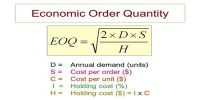Cost accounting is the process of collecting information about the costs incurred by a company’s activities, assigning selected costs to products and services and other cost objects, and evaluating the efficiency of cost usage.
Cost Accounting has certain limitations. Important among them are as follows:
(a) Based on estimates: Indirect costs are not charged fully to a product or process. It is charged to all the products and processes on the basis of estimates. Actual cost varies from the estimated cost. Due to these limitations, all cost accounting results are taken as mere estimates.
(b) Lack of uniformity: Procedures of cost accounting followed by different organizations are different for different products. There is no uniformity. There is also a possibility of difference in pricing material issues for production. All these lead to different cost results for the same operation.
(c) Many conventions: There are many conventions for classification of costs, pricing of material issues, apportionment of indirect costs, adoption of marginal or standard cost, etc. These create difficulty in determining the exact cost because no one type of cost is suitable for all purposes and in all circumstances.
(d) Expensive: Cost accounting is expensive. It involves lots of clerical won for maintaining various costing records for different purposes. For medium and small size concern, the benefit derived from a costing system may not justify the cost involved.
(e) The result requires reconciliation: Information and results provided b; financial accounting and cost accounting may be different for them as an activity. This requires reconciliation to find out the correctness of the two before taking any decision.
(f) Dependent: It is not an independent system of accounting. It depends on other accounting systems.
(g) Does not include all items of expense and income: Items of purely financial nature such as interest, financial charges, discount and losses on an issue of shares and debentures, etc., are not taken into consideration in Cost Accounting.
(h) Not an exact science: Like other accounting systems, it is not an exact) science but an art that has developed through theories and practices.














